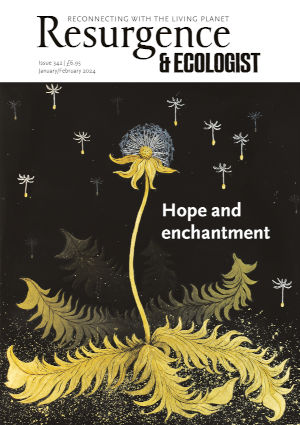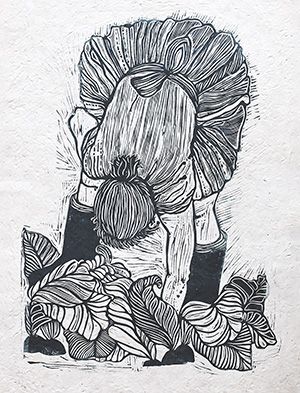There’s a saying attributed to Einstein that can be applied to most situations. We all know it: “You cannot solve a problem with the same mind(set) that created it.” Yet, despite many of us acknowledging our way of living as problematic, we tend to accept solutions that benefit capitalism rather than dismantle it.
As Chris Smaje, the author of Saying NO to a Farm-Free Future, suggests, this is because the chatter around sweeping solutions tells us what we want to hear: that the present crises of climate breakdown, extreme weather, food and water insecurity, wars and injustice can all be healed through “tech innovation”, and without major changes to the comfortable consumerist lifestyles we’ve become accustomed to in the global north. Yet, as climate breakdown speeds up its collapse, and we come catapulting towards a crossroads, considering alternatives free of energy-sucking technology, as presented in books like this, becomes essential.
Written as a meticulous but respectful response to ecomodernist journalist George Monbiot’s 2022 book Regenesis, Smale’s book presents a convincing (and equally scientifically referenced) alternative to Monbiot’s focus on manufactured food and vast rewilding as a solution to wildlife loss and food security. A path that both Monbiot and Smaje agree could open the doors to the same industrialised hierarchy of state–corporate monopoly that precipitated the current crisis.
Smaje’s book offers a more hopeful view, painting a picture of a future that allows us to free ourselves from the reckless arms of capitalism by decentralising power, localising ourselves, and putting decision-making and solution-finding back into the hands of small-scale farmers and communities. And by (re)learning how to live in communion with the land by stewarding it through locally produced food, as part of the web of life.
Beyond the practical, spiritual and environmental bene-fits, Smaje outlines how, if we’re to stop burning fossil fuels, energy will be a sparse commodity. He reminds us that while changes to almost every industry and lifestyle will be drastic, one major area we already hold knowledge in, practising with sunlight alone, is diverse mixed farming, which, without fossil fuels to propel food items worldwide, will be needed to support local communities. To some this may sound drastic, but in many ways it is the only realistic answer. As Saying NO to a Farm-Free Future outlines, manufactured food requires the use of astronomical levels of energy we will no longer have access to (not to mention the other issues of health and wellbeing for both people and planet associated with its creation and distribution).
Currently, the author estimates, around 70% of the world’s population is already living in this envisioned way – producing household and community needs without significant participation in global commodity chains. With sunlight alone. It’s happening, it’s hopeful, and it’s in our power to embrace. It’s just a matter of making it an accessible norm within the lands of the worst polluters. In Smaje’s words, “We’re unlikely to succeed in rewilding farmed landscapes if we don’t start rewilding ourselves.” And by rewilding ourselves, we “indigenise” ourselves, based on Sand Talk author Tyson Yunkaporta’s definition, which Smaje shares in the book, “as a member of a community retaining memories of a life lived sustainably on a land-base, as part of that land-base”. Returning to Nature as part of Nature, rather than as a separate entity.
Saying NO to a Farm-Free Future: The Case for an Ecological Food System and Against Manufactured Foods by Chris Smaje. Chelsea Green Publishing, 2023. ISBN: 9781915294166.








